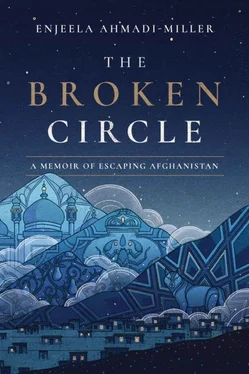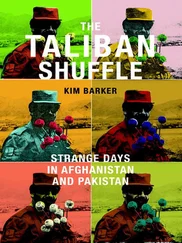I heard Mommy’s high heels clicking on the marble floor behind me. She was dressed to travel too. Her luggage was already being stowed in the car.
“Where are you going?” I asked.
“I have to go, Enjeela, to have a heart operation. In India.”
“I can come with you. I can help you.” I reached out to take her hand, but she brushed me off.
“No, you can’t. You have to stay here with your sisters and brothers and father.”
“When are you coming back?”
She looked past me through the open front door. I could hear Noor and Shapairi talking about their luggage and the trip.
“I don’t know.” Her hair was perfectly curled; her coat and shoes were new. She brushed something off the front of her coat.
“I have to go with you,” I begged. “You can’t leave me here.”
“Oh, Enjeela, you’re being dramatic. The rest of your family is here. You won’t be alone.”
She maneuvered her way around me, and I followed her outside. I begged her again to let me come with her; I needed to be with her and Vida. What would I do without them? Mommy didn’t turn around to look at me again.
Noor had the car packed, slammed the trunk, and stood by it with a blank stare on his face. I looked at him as if he could help me, but he only shrugged and turned to the house.
It had rained the night before, and the grass and dirt by the driveway were moist and still damp. “Mommy,” I pleaded, “you can’t leave me here alone.”
She slipped into the back seat, and the driver closed the door. The car started and slid slowly out of the drive, and I could see the back of Mommy’s head, her hair perfectly coiffed for her flight to India. She didn’t turn back once to wave or smile or give me any hope that I would see her again. I watched the car disappear around the corner at the far end of the street. I continued to cry and call to her, thinking she could not be leaving so suddenly without telling me when I would see her again.
I sank to my knees in the grass that had turned muddy in the rain. Noor came up to me and said something. He tried to pull me up by my arm, out of the grass and mud, but numbness had taken over my body, and all the strength had run out of me. I flopped onto the grass, my face in the muddy water. What had I done to deserve this? Tears erupted, racking my body with uncontrollable sobs. I couldn’t understand why she would leave me behind. Even after I begged her to take me with her. What would it be like from here on with just Padar?
Padar came home that night from the embassy with two cases of Scotch whisky stacked in the trunk of his large sedan. Noor went out and helped him carry the boxes into the house. Padar didn’t say much at dinner that night. Our family was now Padar, Ahmad Shah, Zia, Laila, Zulaikha, and me. Four of us were gone. Six of us were here. We watched in silence as he drank his Scotch all through dinner. He sipped his Scotch after dinner, slumped on a sofa in the family room. He drank his Scotch into the depths of the dark hours of the morning.
Mommy had left us.
The twenty-fifth of December 1979 was a cold day, with chilly winds whipping off the snowcapped mountains to the north and sweeping across the city, a harbinger of a new way of life that marched in with a rumble. I was sitting high in the pear tree that afternoon, bundled up against the cold. The winds left a clear, icy-blue winter sky. I pulled my coat tighter around me and braced myself against a branch, waiting for my sisters to come home from school. From my perch, I could see the fruit trees that filled the acres around our house, and the volleyball court and the maids’ quarters and guesthouse, and in front of me, the gate that led to the street.
Mother had been gone for more than a year; my sisters and I kept asking Padar when she would return, but he would only shake his head and mumble something unintelligible under his breath. Several times, I overheard him speaking to Noor about her. Padar had spoken to Mother on the phone. She wanted all of us to join her in India, but he told Noor he would never leave Afghanistan. Even though the fighting grew worse, he loved his country. It was his home. There was a tinge of anger in his voice as he talked. Why should he run away from his own country? I knew Padar as an optimist, a man who believed the best about men. That they wouldn’t act like mad dogs forever. But he had little insight into the future. How events would overtake all of us. The army had assumed control of nearly every aspect of daily life, the police, the courts, the schools, the prisons. Still, the unrest continued. There was an exodus of friends and neighbors, doctors and lawyers; anyone whose loyalty to the new government was questioned either fled or was arrested.
I sat for hours that cold day in the limbs of the pear tree, imagining that if Mommy would only see life through Padar’s eyes, that Afghanistan was his home, for better or for worse, she would come through the front door with all of her luggage, give me a hug, pat me on the head, and start telling everyone what to do. She would ask why wasn’t this clean, and what’s that on the floor, and then she would sniff the air and ask what’s that smell? She would make everyone clean until the house sparkled. And then she would take me shopping to the bazaar for new fabric to sew us clothes and buy me ice cream. Everywhere in the house, she stood there with her hair neatly curled, dressed in a chic skirt and silk blouse, eyeing me in case I didn’t wash my hands or brush my teeth or my hair was out of place. I kept wondering if she would have taken me with her had I been better at staying clean, had I dressed nicer like Shahnaz and Shapairi.
That morning dragged on, and I was thinking about showing up in the kitchen to see what Noor was cooking and to warm myself and find a tasty treat, when the branches of the trees began to shake. I thought it must be an earthquake. We had one once, and many buildings had been destroyed. Just then, warning sirens went off all over the city. These were the emergency warning sirens for disasters, not the police or fire sirens. The rumbling grew louder, and something large and mechanical rolled up my street. I scurried down, hit the dirt hard, ran across the grass, and clutched the gate, squeezing my face through the bars.
A long line of dark-green machines trundled up the road, churning up dust, creaking and grinding. I remember that I didn’t have any idea what these machines could be. They were some form of tractor. But these were much larger than tractors, and they were covered with green metal plates, and each of them had long barrels sticking out of the front. They reminded me of the barrels of rifles, only they were far too long and heavy for a man to carry. I had never seen an army tank, and I didn’t know until later what they were used for. They had a blazing red star painted on their sides, and soldiers with grim faces were on top pointing machine guns. They didn’t look at all like Afghan soldiers, who were thin and wore baggy uniforms. These men were ruddy, well fed, and had the hard look of warriors ready to do battle.
The line of tanks with their metal wheels paraded by; soldiers pointed their guns at people on the street as they passed. The tanks billowed grimy exhaust, and the clatter of the treads was so loud, I was sure they were tearing up the pavement. I hung on the wrought-iron bars that vibrated in my hands and stared down the street—a tank stopped in front of our house, its motor idling.
I stood petrified, my hands fixed to the bars as I stared up at the soldier on top of the tank, who stared back at me, both his hands wrapped around his weapon. I smiled up at him. And he looked away. At that moment, I was more amazed at the sight than afraid of these soldiers. The war had always been somewhere else, not on our street. And they looked so out of place, staring at us as if we were the intruders, not them. Noor grabbed my arm from behind and pulled me inside the house and slammed the door behind us.
Читать дальше












